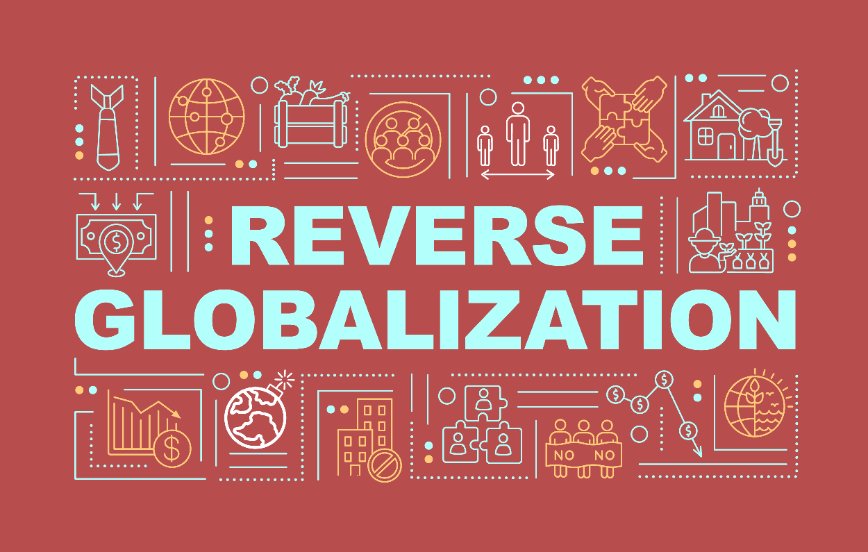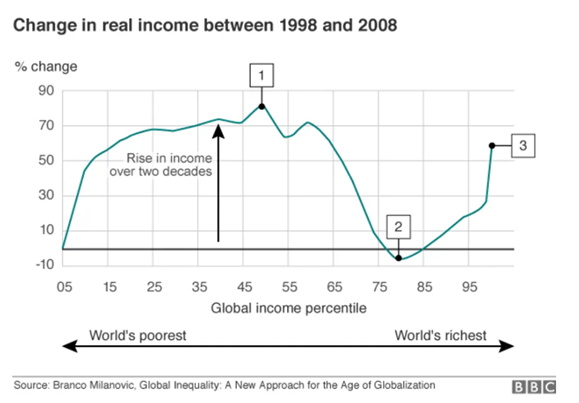Application Exercise 8ab: The anti-globalisation turn?

- Explain why some commentators consider the election of Donald Trump and the vote for Brexit as signs of a turning of the tide against globalisation.
Donald Trump made rejection of the global integration of the world economy a centrepiece of his campaign. He spoke about ‘Americanism, not globalism, will be our credo’. In addition, Trump’s supporters claimed that only a handful of people had gotten rich off globalisation, and a lot of people had been left behind. Trump began a ‘trade war’ with China that included imposing substantial tariffs on imports, and China retaliated with tariffs on US imports. He has regularly implemented policies that indicate he is not keen on any form of global agenda or action.
Brexit was a vote for the United Kingdom to leave the integrated economic block that was the European Union. It was based on the idea that globalisation (and in particular integrating with the rest of Europe in a united economy) had not benefited the majority of Britons. Increasing numbers of them believed that globalisation had benefited a small privileged elite, ‘but not them’. Perhaps it was time to rethink the assumption that a ‘flexible globalized economy can generate prosperity that is widely shared’.
- Identify those who the case study suggests are most likely to actively campaign against globalisation.
- less-skilled workers in developed countries
- those who live in areas where high rates of long-term structural unemployment had created major social problems
- Use data from case study to support the claim that some workers in the West have been ‘left behind’ by globalisation.
As noted by Joseph Stiglitz, the bottom 90% of income earners in developed countries such as the US have endured income stagnation for a third of a century. In the same country, median income for full-time male workers is actually lower in real terms than it was 43 years ago. At the bottom of the income distribution, real wages are comparable to their level 60 years ago. And life expectancy among segments of white Americans is actually declining.
- Explain two policies or actions a government could implement to support those negatively affected by globalisation.
Two policies available to governments to support those negatively affected by globalisation are:
- Training and education – to upskill those who have lost employment due to the relocation of their jobs via offshoring/ outsourcing or replacement by technology.
- Providing a Universal Basic Income to those who have not been able to find new employment or retrain.
- Implement more progressive taxation regimes to enable the benefits of globalisation (gained by those with higher incomes, or through growth in company profits) to be redistributed to those who have been ‘losers’ from globalisation.
- View Brank Milanovic’s ‘elephant chart’ along with an explanation here: https://www.bbc.co.uk/news/business-37542494 . Describe what the chart shows, using data from the chart to support your answer.
Milanovic’s ‘elephant chart’ which plots the growth in real income for each percentile of the world’s population in the twenty years to 2008.
It shows that income growth for the world’s growing middle classes in India and China has been substantial. However, at the same time, the world’s poorest have seen minimal income growth (the rear end of the elephant) , and the working and middle classes in the wealthy west have experienced no, and sometimes even negative, real income growth (where the trunk of the elephant starts to turn down and goes below zero). In addition, those at the very top of the income scale (the actual trunk lifting up at the end) have seen their incomes grow at an incredibly rapid rate.

6. Some commentators argue that it is only right that, in a world of limited resources, those who are already wealthy sacrifice their own economic advancement to ensure that the global poor are lifted out of poverty. Explain your response to this suggestion.
Student responses to this question will be dependent on their own perspectives.
